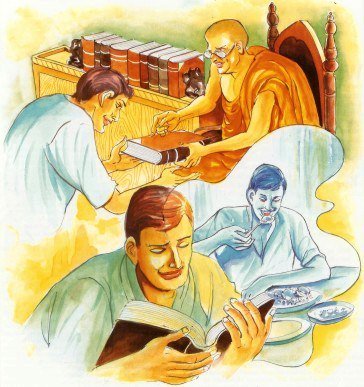Though briefly one intelligent
might wait upon the wise,
quickly Dhamma he can sense
as tongue the taste of soup.
Explanation: If a wise person were to associate with a wise person, even for a moment, he will quickly understand the Teaching. This is very much like the tongue being able to discern the subtle flavours of soup. This stanza could be further appreciated when you contrast it with the previous one. In the previous one the image used is the soup. Though it serves tasty food endlessly, it just cannot appreciate how food tastes, very much like a foolish individual being unable to appreciate the teaching even when he keeps company with the wise. An intelligent man, even though he is associated with a wise man only for a moment, quickly understands the Dhamma, just as the tongue knows the taste of soup.
The Story of Thirty Monks from Patheyyaka (Verse 65)
While residing at the Jetavana Monastery, the Buddha spoke this verse, with reference to thirty monks from Patheyyaka.
Thirty monks were taught the Dhamma by the Buddha in the Kappasika Grove. Thirty youths from Patheyyaka were, on one occasion, enjoying themselves with a prostitute in a forest. Then the prostitute stole some of their valuable ornaments and ran away. While searching for her in the forest, they met the Buddha. At that time all of them obeyed the command of the Buddha, “Come, monks!” and they received bowls and robes created by supernatural power. Taking upon themselves the thirteen pure practices, they returned after a long time to the Buddha, hearkened to his discourse on the beginningless, and before leaving their seats, attained arahat-ship.
The monks began a discussion in the Hall of Truth: “On how short a time did these monks perceive the Dhamma!” The Buddha, hearing this, said to them, “Monks, this is not the first time these thirty companions committed sin. They did the same thing in a previous state of existence. But hearing the religious instruction of Venerable Tundila in the Tundila Jataka, they perceived the Dhamma very quickly and took upon themselves the five precepts. It was solely through the merit acquired by this act that they attained arahatship immediately, even as they sat in their seats.”

